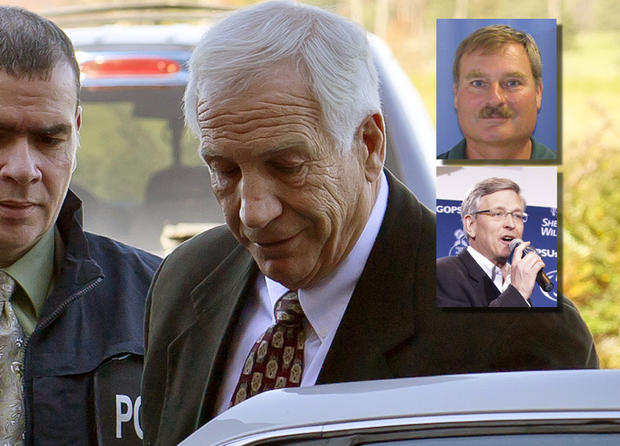Penn State sex abuse scandal: Why didn't anyone call the cops?
(CBS) - The question many people are asking in the wake of the sex abuse scandal at Penn State is simply this: Why didn't anyone call the cops?
The explosive grand jury report found that at least eight people at Penn State had either witnessed former coach Jerry Sandusky molesting children, or been told that others had witnessed abuse. And yet, it seems, not one of them informed law enforcement authorities.
Pictures: Who's who in the Penn State child sex abuse scandal
Pictures: Joe Paterno
Pictures: Child-sex scandal rocks Penn State
All states have laws compelling "mandatory reporters" - including teachers and other school personnel, social workers, physicians and child care providers - to report child abuse to authorities. According to the Department of Health and Human Services, 47 states impose penalties for failing to report child abuse, with 39 of those states classifying the offense as a misdemeanor.
But according to several experts, the two Penn State administrators who have been charged with failing to report what they had learned about Sandusky are among only a few who have been charged with the crime in years.
Frank Cervone, executive director of the Support Center for Child Advocates, told Crimesider he can think of only two other cases where someone was charged with failure to report. One is the ongoing case of Kansas City, Mo. bishop Robert W. Finn, the clergyman charged in connection with the Catholic Church sex abuse scandal; the other is the 1994 case of a Philadelphia doctor who was accused of not reporting suspected physical abuse of his minor patient.
Scott Berkowitz, President of the Rape, Abuse and Incest National Network (RAINN), was similarly unable to recall other cases.
Neither could Howard Davidson, the director of the American Bar Association's Center on Children and the Law. However, Davidson says "I have to believe people are prosecuting failure to report," but because there is no national data on the offense or its prosecution, no one knows how often or under what circumstances.
"In almost every state failure to report is a misdemeanor, which sends a big, loud message that we're not going to take this seriously as a crime," says Berkowitz. "Civil suits, on the other hand, have made institutions pay attention. [For now] big judgments seem to be more effective than fear of running afoul of these misdemeanors."
In Pennsylvania, where former Penn State athletic director Tim Curley and senior vice president for finance and business Gary Schultz have been charged, failing to report child abuse doesn't even rise to the level of a crime for the first violation, says Cervone.
As Curley's attorney Caroline Roberto reportedly put it at her client's arraignment Monday, the charge amounts to nothing more than a "speeding ticket."
That may not be the case for long, however. On Thursday, Pennsylvania State Rep. Kevin Boyle (D-Philadelphia) announced he plans to introduce legislation that would mandate that people who witness abuse must report it to legal authorities, not just their supervisor.
"In light of the alleged child sex abuse scandal at Pennsylvania State University, it is clear that a loophole exists in our law," Boyle said in a statement. "My legislation would close that loophole by requiring those who are aware of the abuse to report it to law enforcement authorities, rather than simply following an in-house chain of command."
Maureen Farrell-Stevenson, the director of the National Association of Counsel for Children, says that the Penn State case is likely to prompt legislators all over the country to take a look at their reporting laws and "see if they are adequate."
According to Cervone, head of the Support Center for Child Advocates, Pennsylvania has actually addressed this issue before. In 2006, after revelations about how the Catholic Church covered up abuse within its ranks chilled the public, the legislature amended the state's mandatory reporting law.
Before the new law went into effect in 2007, Cervone explains, "In order to trigger the duty to report, a child had to actually come before the reporter who was dealing with the child in a 'professional capacity.' But the scenario that happened over and over was that a parent would hear from their child that a pastor touched them, and then go to another pastor and say this is what my child told me. But then the pastor didn't have to report because the child didn't go before him directly."
"The mind of the original statute," continues Cervone, "was we're not going to cause a duty to report with strictly heresay information, but the legislature saw this as a silly farce," and in 2006 passed a law that eliminated the language mandating that a child come before you. The new law, says Cervone, requires that anyone in an organization with reasonable cause to suspect child abuse must report their concerns to state authorities.
Still, because Curley and Schultz are charged with failing to report crimes that allegedly occurred in 2002, Cervone believes that their defense will be that they are not mandatory reporters because the abused child didn't actually come before them.
"When people don't report suspicions of abuse, it's terrible for the victims," says Berkowitz, the president of RAINN. "Abusers often get their victims not to tell by convincing them that no one will believe you. Any victim looking now at how [the leaders at Penn State] reacted may think, 'my abuser was right, no one does care.'"

